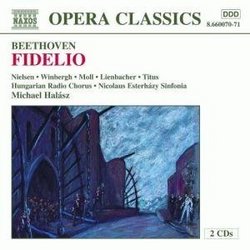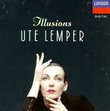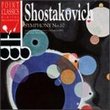| All Artists: Inga Nielsen, Gosta Winbergh, Michael Halasz, Nicolaus Esterhazy Sinfonia, Kurt Moll, Alan Titus, Edith Lienbacher, Herwig Pecoraro Title: Beethoven: Fidelio / Halasz Members Wishing: 0 Total Copies: 0 Label: Naxos Release Date: 11/30/1999 Genre: Classical Styles: Opera & Classical Vocal, Historical Periods, Classical (c.1770-1830) Number of Discs: 2 SwapaCD Credits: 2 UPC: 730099607025 |
Search - Inga Nielsen, Gosta Winbergh, Michael Halasz :: Beethoven: Fidelio / Halasz
 | Inga Nielsen, Gosta Winbergh, Michael Halasz Beethoven: Fidelio / Halasz Genre: Classical
Beethoven's sole opera hardly wants for good recordings. The old Vickers/Ludwig set under Klemperer, for one, has been remastered and is magnificent. But this new set fills a nice gap. Unlike Klemperer (and Furtwängl... more » |
Larger Image |
CD DetailsSynopsis
Amazon.com Beethoven's sole opera hardly wants for good recordings. The old Vickers/Ludwig set under Klemperer, for one, has been remastered and is magnificent. But this new set fills a nice gap. Unlike Klemperer (and Furtwängler, for that matter), conductor Michael Halasz takes a less enormous, less romantic view of the opera, emphasizing the intimate moments. Tempi tend to be fleet without drawing attention to themselves, and the spoken dialogue has been kept to a minimum. In keeping with his viewpoint, Halasz has opted for lightish voices for his two protagonists. Gösta Winbergh is a superb Mozartian, but he has also grown into a fine Lohengrin. His Florestan here is beautifully drawn: lyrical and introspective but able to rise to the heroic moments as well. Much the same is true of Inga Nielsen, a bright-toned soprano with a keen mind for the drama and a voice capable of getting up, down, and all around Leonore's difficult music. Indeed, when these two sing "Namenlose freude," every note is sung on pitch and clearly. Alan Titus's Pizarro is nice and nasty, and the fine bass Kurt Moll infuses Rocco with real feelings. The rest of the cast, except for the Don Fernando, who sounds old enough to have sung at the original 1814 performances, is fine, and the orchestra (slightly reduced, it appears) and chorus are excellent. And look at that price! Highly recommended. --Robert Levine Similarly Requested CDs
|
CD ReviewsSplendid recording; Splendid Value John Cragg | Delta(greater Vancouver), B.C Canada | 07/26/2000 (5 out of 5 stars) "Naxos operas seem to come in two varieties: good at the price and just plain good. This is one of the latter. Fidelio is certainly a unique opera, but that doesn't mean that it has to be treated monumentally as so many recordings do. Michael Halasz treats the work on a human level, well supported both by the orchestra and chorus and by the principals. Gosta Winbergh's light tenor turns out to be very suitable for Florestan and Inga Nielsen makes for a very convincing Leonore. I found that the others all did a good job. The recording is excellent and the diction clear. What more could you want? -- well the libretto is only in German, but there is an extensive synopsis in English which is keyed to the various tracks. This version may well be my favorite Fidelio, and the price cannot be beaten!" Beethoven's Fidelio on Naxos Robin Friedman | Washington, D.C. United States | 12/29/2003 (5 out of 5 stars) "Beethoven had an extraordinarily difficult time in the composition of Fidelio, opus 72, his only opera. He first worked on Fidelio during 1803-1804. The opera received its first performance in Vienna in 1805 but closed after only three performances. Beethoven was urged to shorten the opera, and reluctantly he agreed. The revised version was produced in 1806 but closed after only one performance. Finally, Beethoven revisited Fidelio in 1814 and spent months of heavy effort in revising it yet again. The revised version was performed in 1814. This time it succeeded, and the work has been part of the opera repertory ever since. When he revised Fidelio in 1814, Beethoven remarked: " I could compose something new far more quickly than patch up the old... I have to think out the entire work again." Anyone who has done substantial writing or editing can understand Beethoven's difficulties.For all its difficulties, even in the final version, Fidelio is inspired music and one of the essential works of Beethoven's maturity. Beethoven worked heroically to compose his opera, and Fidelio is heroic in its themes. It tells the story of a young woman named Leonore who disguises herself as a man with the name of Fidelio and risks her life to rescue her husband, Florestan, from a dungeon where he has been held two years as a political prisoner. The work opens with a background of human suffering and ends in triumph as Leonore succeeds in entering the prison and rescuing Florestan, at the last moment, from murder by Pizarro, the governor. The work is celebrates human freedom and the treasures of winning a loving wife, both themes dear to Beethoven. It also celebrates the wise ruler who appears in the person of Don Fernando in the final scene of the opera to set matters aright. As the work progresses, it becomes less and less a characterization of specific people, Leonore and Florestan, and more an idealization of human freedom and of matrimonial love.Fidelio is full of music both heroic and lyrical. Beethoven's lyricism, and his writing for the human voice difficult as it is, are often underestimated. Beethoven wrote four overtures for his opera. His final attempt, the "Fidelio" overture, was written for the 1814 performance and masterfully sets the stage for what follows. There is a beautiful "canonic" quartet early in the opera (no. 3) and a moving chorus for the prisoners at the end of the first act when Leonore prevails upon the prison guard to allow them into the courtyard for air (no 10) Each of the major characters in the opera has a solo aria, and there is a collection of duets, trios, and two quartets. Florestan has a long, moving aria at the beginning of the second act (no. 11) lamenting his fate and recalling happier days with Leonore. There are rousing choruses of triumph in the final scene after Leonore has rescued Florestan. There are many recordings of Fidelio featuring famous conductors and soloists, but I found this Naxos CD first-rate. The opera is performed by a small chamber orchestra, the Nicolaus Esterhazy Sinfonia, conducted by Michael Halasz. (The Esterhazy Sinfonia has also recorded very well the nine Beethoven symphonies on Naxos, but I found this Fidelio more impressive than the symphonies.) Soprano Inga Nielsen sings Leonore and performs with clarity and nobility. The role does not present an easy vocal line and Ms. Nielsen signs believably. Tenor Gosta Winbergh sings Florestan. His voice is rather light, but he brings passion and force to his great aria at the beginning of act 2. The scene in the dungeon where Leonore reveals her identity and comes to her husband's aid against Pizarro is dramatically effective. Alan Titus, baritone, as the villanous Pizaro brings the character to life in his aria in the first act (no.7)For listeners new to opera or to Beethoven, this is an ideal place to start. The Naxos version sells for a budget price which should add to the incentive to explore this music. I also think there is something to be gained by coming to the music through a fine performance by relatively unknown artists. It helps the listener, particularly the new listener, focus on the score and on the singing and not worry a great deal about comparing this version with others. I think that the first priority in listening to a work of music should be -- the music. This CD may encourage new listeners to get to know Fidelio and then, if they are so inclined, to explore other versions and other music.The CD includes a full libretto in the original German but no English translation. There is a full synopsis of each number, sufficient to allow an appreciation of the action and the arias. Altogether,this is an excellent performance of a great and inspirational work of Beethoven's maturity." An outstanding performance in every way Laykok | Singapore, Singapore Singapore | 05/01/2000 (5 out of 5 stars) "Fidelio was the first opera I listened to as a teenager and I've loved it so much that I have since collected some six different recordings (Klemperer, Karajan, Bernstein, Fricsay, Bohm, Maazel. This latest newcomer is a welcome addition. The sound is extremely clear and detailed with excellent spatial separation of voices and instruments. The protagonists are relative lightweights compared to the likes of Christa Ludwig and Jon Vickers but they have the advantage of clearer diction and clarity. The balance between soloists, chorus and orchestra is exemplary and the finale of Act 2 is gripping and hot-blooded stuff. At bargain price this opera set is an outstanding purchase. Buy it!"
|

 Track Listings (20) - Disc #1
Track Listings (20) - Disc #1

